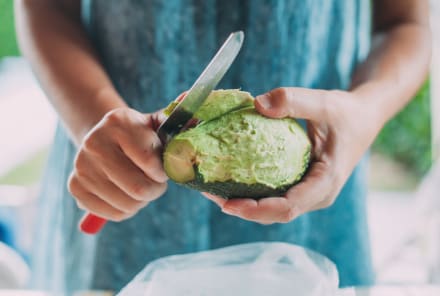Advertisement
4 Nonnegotiable Ways To Strengthen Your Teeth (Beyond Brushing & Flossing)


When it comes to optimizing your health and well-being, how often do you think about your teeth and gums? If you respond with, not often, you're not alone—but it's high time we give oral care the attention it deserves.
Your mouth, after all, is the gateway to your body and the beginning of your gastrointestinal tract. Poor oral health has even been linked to dementia1, and periodontal disease2 is associated with chronic, systemic inflammation in the body.
"There has to be more respect for the oral microbiome," says functional dentist Mark Burhenne, DDS, creator of Ask the Dentist, on this episode of the mindbodygreen podcast. But that respect goes way beyond brushing and flossing—below, find four extra ways to tend to your teeth:
Tongue scraping
"Tongue scraping is the most underappreciated aspect of oral care," Burhenne claims. "Everyone should be tongue scraping."
A tongue scraper is a long, thin, flat piece of metal (or plastic) shaped like a "U" to remove bacteria, food debris, and dead cells from the surface of the tongue. "You basically reach back as far as you can on the tongue, stick your tongue out, and drag this forward a few times along your tongue," Burhenne explains. It's a ritual practiced for centuries in Ayurveda, known as Jihwa Prakshalana.
Why is it helpful? Well, Burhenne compares your tongue to a shag carpet—it easily traps debris and bacteria in its nooks and crannies. As that material accumulates over time, it can lead to improper biofilm formation on the tongue.
It can also potentially lead to overeating, says Burhenne, as the taste buds on your tongue aren't as strong underneath that buildup.
"There's some new research3 [that] satiety is not linked to stretching of the stomach receptors. It's based on the amount of flavor that you're getting on the tongue," he says. "So if you're not tongue scraping, you're probably overeating because you're not tasting your food." The more you know!
Diet
On the topic of eating, balanced nutrition is also very important for oral health, says Burhenne.
It's a two-way street: "If you have diabetes, it's going to make things in the mouth worse," he notes. "If you have gum disease, it makes it more difficult to control4 your blood sugar levels. It's all connected."
That said, a diet that helps balance blood sugar and improves lean muscle mass will also be A+ for oral health. Think lots of vegetables, fiber, and of course, quality protein, says Burhenne.
Mouth taping
Take it from Burhenne: "If you breathe through your mouth, you are going to have oral health issues and complications."
That's not to say you can't ever breathe through your mouth again, but do try to stick to nasal breathing whenever you can help it—and when you can't help it, like during sleep, that's where mouth taping comes into play.
See, mouth breathing impacts the pH of your saliva, Burhenne explains. "Saliva is the life giver in the mouth. It supports the oral microbiome, and it helps prevent decay. It activates the immune system. It allows us to speak and swallow and digest foods," he adds.
And if you mouth breathe, say, six to eight hours every night, "that's a long stint of having to put up with a lower pH in the mouth and unhealthy state of the oral microbiome," Burhenne says. So he highly recommends using a mild tape to encourage your mouth to stay shut. Here's our full guide to mouth taping if you want to learn more about getting started.
Avoid mouthwash
Mouthwash is incredibly antibacterial, but you want a healthy balance of bacteria to keep the oral microbiome thriving.
"Most [mouthwashes] kill a portion of the oral microbiome, mostly on the back of the tongue," says Burhenne, and these bacteria are responsible for producing nitric oxide from our food.
Nitric oxide, as a refresher, is a molecule that influences immune function, weight, circulation, blood pressure, mood, and more. It's no wonder, he says, that research shows frequent use of mouthwash is associated with an increased risk of prediabetes5.
Of course, sometimes mouthwash is medically necessary (like with infections or post-procedure), so please listen to your health care professional. You can also find rinses that don't use alcohol or antiseptic ingredients.
But generally, 'the action of swishing really doesn't move the needle as much as brushing with a paste," says Burhenne. "At best, it's a waste of your money. At worst, it's having systemic effects."
The takeaway
Oral care means more than brushing and flossing. Just take it from Burhenne: "Brushing and flossing is not the only thing that saves us," he says. "Just do that alone, and you're still going to have decay." Supporting the oral microbiome requires multiple approaches, including your nutrition and sleeping habits. Like most aspects of well-being, it's all about balance.
We hope you enjoy this episode! And don't forget to subscribe to our podcast on iTunes, Google Podcasts, Spotify, Amazon Music, or YouTube!
Watch Next
Enjoy some of our favorite clips from classes
Enjoy some of our favorite clips from classes
What Is Meditation?
Mindfulness/Spirituality | Light Watkins
Box Breathing
Mindfulness/Spirituality | Gwen Dittmar
What Breathwork Can Address
Mindfulness/Spirituality | Gwen Dittmar
The 8 Limbs of Yoga - What is Asana?
Yoga | Caley Alyssa
Two Standing Postures to Open Up Tight Hips
Yoga | Caley Alyssa
How Plants Can Optimize Athletic Performance
Nutrition | Rich Roll
What to Eat Before a Workout
Nutrition | Rich Roll
How Ayurveda Helps Us Navigate Modern Life
Nutrition | Sahara Rose
Messages About Love & Relationships
Love & Relationships | Esther Perel
Love Languages
Love & Relationships | Esther Perel
What Is Meditation?
Box Breathing
What Breathwork Can Address
The 8 Limbs of Yoga - What is Asana?
Two Standing Postures to Open Up Tight Hips
How Plants Can Optimize Athletic Performance
What to Eat Before a Workout
How Ayurveda Helps Us Navigate Modern Life
Messages About Love & Relationships
Love Languages
Advertisement

This Underconsumed Nutrient Helps Fight Gum Inflammation, Study Shows
Molly Knudsen, M.S., RDN

Research Shows Cognitive Longevity Depends On These 3 Critical Vitamins
Molly Knudsen, M.S., RDN

This Underconsumed Nutrient Helps Fight Gum Inflammation, Study Shows
Molly Knudsen, M.S., RDN

This Underconsumed Nutrient Helps Fight Gum Inflammation, Study Shows
Molly Knudsen, M.S., RDN

Research Shows Cognitive Longevity Depends On These 3 Critical Vitamins
Molly Knudsen, M.S., RDN

This Underconsumed Nutrient Helps Fight Gum Inflammation, Study Shows
Molly Knudsen, M.S., RDN











